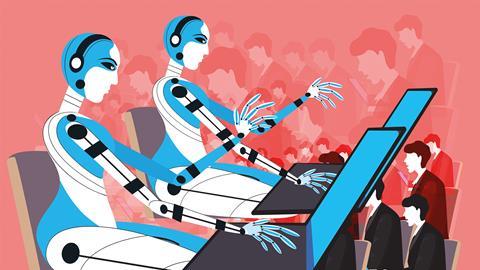OpenAI’s ChatGPT showcased the potential for automating legal processes. Just 12 months later the market is evolving rapidly
Almost exactly a year after the public launch of OpenAI’s ChatGPT on 30 November 2022, generative AI is dominating the business pages. Headlines concerning OpenAI’s leadership crisis cap a year in which generative AI has dominated the zeitgeist. The long-running discussion about whether AI can replace lawyers has been revived by new AI applications that automate legal processes. But attitudes have changed. Products are being launched into a market that is now both more receptive and more tech savvy than ever before.

Semi-autonomous contracting
In November, Luminance showcased the first AI end-to-end contract negotiation. Luminance is a legal AI pioneer, founded in 2015, and one of the very few first movers not to have been acquired. Its large language model helped to revolutionise document review and analysis across multiple legal processes. It is widely used by law firms and corporate legal teams to expedite tasks that involve high volumes of documents, such as corporate diligence, e-discovery, and contract drafting, analysis and automation. A demonstration of its AI contract negotiation tool – Luminance Autopilot (currently in beta) – was covered by the BBC. This showed Autopilot negotiating a non-disclosure agreement between Luminance general counsel Harry Borovick and a Luminance customer – without the involvement of either lawyer. In a few minutes, after several rapid iterations, it produced a version of the contract that was acceptable to both parties. This was automatically sent to DocuSign which returned it to the parties for checking and e-signature.
I asked Borovick how the key negotiating points were established. He explained that, before starting Autopilot, both parties would input parameters that aligned with their corporate governance rules. Autopilot identifies any conditions that fall outside those rules and negotiates on behalf of the parties to produce a mutually acceptable contract. Luminance managing director and chief of staff Jaeger Glucina added that the software learns from parties’ previous documents, so it understands their standard contract terms and corporate governance rules and incorporates them into the negotiation.
Autopilot is not intended to replace a lawyer in contract negotiations. Rather it is designed to save time by highlighting areas of possible contention. But it cannot replace the whole process, as the contract needs to be checked and signed off. ‘You still need an authorised signatory for a contract to be legal,’ said Glucina, likening autopilot to a semi-autonomous vehicle. ‘It will change lanes for you, but it won’t set the destination.’
Autopilot improves with experience, so it becomes more accurate and boosts efficiency exponentially. The software is designed for corporate counsel, who in some industries manage huge volumes of contracts and renewals. As it is an extension to Luminance Corporate, both parties to the negotiation have to be Luminance Corporate customers. The barriers to entry are relatively high – in terms of both parties needing to invest in the software – and the cost per negotiation. However, these costs have to be balanced against the efficiency benefits, and the ability to free up time-poor corporate legal teams.
New (document) generation
Genie AI is a legal AI start-up which provides contract templates. It is also an AI assistant, enabling users to customise and review documents. Last week it added a create feature (built on GPT-4, Claude 2 and its own proprietary language models) which enables users to generate complex agreements. ‘This is a significant shift from the traditional way of doing things, where businesses often heavily rely on law firms to draft bespoke agreements,’ says the website. ‘This accessibility to speedy and smooth document generation mimics the interactive experience you might have with your lawyer, only much faster.’ Once a document has been created, the review feature annotates it and produces a risk assessment. The next iteration will add the ability to interrogate and adjust bespoke documents in real time. Genie’s AI legal assistant is free while in beta and can be accessed here: app.genieai.co/signup.
Model family
Data has long been the biggest challenge for large language models in the legal sector, and this is exacerbated by variations in legal terminology. The SALI (Standards Advancement for the Legal Industry) Alliance is a global non-profit dedicated to legal data standards. SALI’s Legal Matter Specification Standard includes 14,000 standardised legal tags, translated into 11 languages. Damien Riehl, a SALI leader, explains that SALI’s taxonomy improves data structure, supporting interoperability between law firms, and between law firms and client businesses, who may use different classifications to describe similar matters. SALI integrates with all major legal tech applications and vendors, many of which have contributed to its data resources and is seeking ISO certification to further extend its reach. SALI’s open source generative AI (GPT-3.5 Turbo and GPT-4) tool, which can be used to classify specific areas of law and create bespoke taxonomies, can be accessed at sali.org or on github.com/sali-legal.
The first AI paralegal
'One of the shortfalls of generative AI is that it’s prone to ‘hallucination’ – saying things that sound right but are complete nonsense. Obviously that’s problematic in a legal context'
Flinn Dolman, Lawhive
Last week, consumer lawtech start-up Lawhive announced that its AI paralegal, Lawrence passed the SQE scoring an impressive 74%, significantly outperforming the average pass rate of 55%.
How was Lawrence built, and how does he compare with a human paralegal? ‘We built Lawrence by combining GPT-4 with our own in-house tech,’ explains co-founder and chief data scientist Flinn Dolman.
He is aware of the failings of generative AI as well as its potential: ‘One of the shortfalls of generative AI is that it’s prone to “hallucination” – saying things that sound right but are complete nonsense. Obviously that’s problematic in a legal context and it’s actually one of the reasons we were interested to test [Lawrence] on SQE questions in the first place.
‘Demonstrating performance on questions that require contextual application of knowledge is a good way of getting a sense of how much your system hallucinates. That said, our view is still very much that these types of systems will need to be closely supervised and not left to act entirely independently for the foreseeable future.’
Lawhive was founded in 2022 as a consumer law platform for freelance solicitors and small law firms. Lawrence’s role is to support solicitors by taking on repetitive tasks, such as filling in forms and templates and interrogating documents for specific information. As generative AI tools learn from experience, the extent to which Lawrence can replace a human paralegal remains to be seen, as there was room for improvement when it came to client interactions and communication.
Contracts are relationships
Generative AI applications are extending the extent to which processes can be automated. But in a 19-page article, Alex Hamilton, CEO of commercial contracting specialists Radiant Law, explained why AI is not yet competent to take over contract generation and negotiation. He made the key point that most firms and legal departments are not using document automation, which has been available for years. Also, they do not have well-structured data, which is the jumping-off point for generative AI.
On negotiation, Hamilton highlighted the findings of the World Commerce & Contracting survey, ‘that contract negotiations focus on what will happen if something goes wrong (liability, indemnities, termination etc) rather than ensuring that it goes right’. He added that ‘the negotiations themselves are often counterproductive in style, with too many lawyers seeming to think that they are there to win, not start a commercial relationship off on a positive and thought-through footing’.
Although in this scenario the emotional detachment provided by software like Luminance’s Autopilot may be an advantage, Hamilton concluded that generative AI won’t lead to more than a 5% reduction in the time spent drafting negotiating or interpreting contracts. While AI might be able to help lawyers make ‘contract templates short, clear, reasonable, and relevant… ultimately corporate decision-making is always about relationships’.
Build it and they will come
Although AI is limited to routine tasks, it is already affecting legal services delivery and roles within law firms. The trainees and junior lawyers who traditionally undertook those routine tasks may instead be deployed prompting generative AI tools and checking their output. And as more tasks are delegated to AI, firms and legal departments will need to re-evaluate routine work and the skills required to deliver it, which now include ‘prompt engineering’ – formulating questions that help the AI chatbot generate useful output.
Notwithstanding the recent drama at OpenAI, it is continuing to evolve its offerings in a way which reflects its non-profit origins, before shifting to a commercial model. OpenAI’s recently released GPT Builder allows anyone to create their own custom GPT. This will make it easier for legal services providers to follow in the digital footsteps of Travers Smith, Dentons, Addleshaw Goddard and Mishcon de Reya and develop their own low-cost solutions. However, while these might disrupt the lawtech landscape, the start-up dynamic and the legal business model, they are not close to replacing lawyers.
But as tools such as Luminance facilitate routine negotiations, freeing up lawyers to concentrate on ‘high-value’ work, ultimately law firms and in-house legal teams will need to redefine ‘high-value’ work and manage the impact of technology on business and client relationships.
Law Society president Nick Emmerson commented on Luminance’s Autopilot demonstration: ‘At present, and probably into the distant future, AI will be unable to fully replace the function of legal expertise provided by legally qualified professionals.’ However, he recognises that delegating traditional legal processes to AI is likely to change the nature of legal services, adding: ‘What it means to be a lawyer is likely to evolve, as will the type of jobs and the skills required.’
































No comments yet